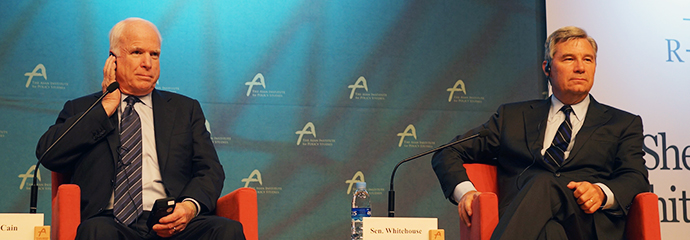On August 26, 2013, the Asan Institute for Policy Studies hosted a press conference with Senators John McCain (R-AZ) and Sheldon Whitehouse (D-RI).
Senator McCain’s prepared remarks, the full transcript of the press conference, and the official press release are available for download above.
Summary
During the press conference, Senator McCain discussed some of the following issues:
The remarkable progress that the ROK-US alliance has made as the two countries celebrate the 60th anniversary of the alliance is a proud achievement. All Americans are proud of the historic role that the United States has played in supporting South Korea’s progress. The US and South Korean success as allies has made the alliance a global alliance, promoting security, prosperity, and democratic values across the globe.
The US commitment to security of the Republic of Korea, including US extended deterrence, is firm and agreed upon by all branches of the US government. On North Korea, no rewards should be given for empty rhetoric and there should be no relaxing of pressure or resumption of Six-Party Talks until meaningful steps are taken by North Korea.
Finally, the United States does not take a position on the sovereignty of competing territorial claims, but the United States, through its experience with the Vietnam War, does understand how difficult and necessary it is to work towards building friendships with former adversaries. This point is stressed by the United States to its Japanese allies.
Trilateral cooperation between the United States, the Republic of Korea, and Japan is indispensable to the security, prosperity, and freedom of all peoples. Shared challenges and opportunities are best addressed when the three countries work together. Outrageous and atrocious historical issues, such as “comfort women,” sometimes need to be resolved in order to more forward and to address common challenges.
Senator Whitehouse also added that:
The Republic of Korea is a remarkable example of democracy and economic growth, and is exactly the sort of example to be spread around the world. The special friendship between the two allies is clouded by one of the most dangerous threats the world now faces, from a nuclear armed and untested North Korean leadership. Working together, the United States and the Republic of Korea can address these issues.
In taking questions from the audience, the senators discussed the following topics:
First, concerns about rightist movements can be alleviated by recognition that Japan and South Korea are both democracies with common interests in strong joint defense against the threat posed by North Korea, addressing China’s assertiveness in the East and South China Sea, as well as the continued success of their free-market economies. Japan and South Korea are both democracies.
Second, the two senators were struck by North Korean defectors and activists’ confidence that the North Korean regime is unsustainable.
Third, Senator McCain does not believe that there will be a formal amending of the Japanese Constitution, but it would be reinterpreted, in keeping with international law. Any such reinterpretation would be scrutinized by the Diet, the Japanese people, and the world. Third, it would be hard to seek a peace treaty with North Korea until North Korea begins to demonstrate actual progress in denuclearization and human rights.
Fourth, human trafficking is becoming more visible and of greater concern around the world. There is broad agreement that the best way to stop it is through exposure and legal efforts to punish offenders. Japan and South Korea, with their common values, can jointly stand for human rights vis-à-vis China. Exposure of the Chinese government returning North Korean gulag escapees to certain torture and death should be cause of embarrassment.
Fifth, on Syria, Senator McCain was convinced that Assad has used chemical weapons. It is doubtful that investigations into allegations of chemical weapon use will be allowed to be thorough. Furthermore, the Obama administration one year ago said use of chemical weapons by the Assad regime was a red line. If the United States does not take serious action, US credibility around the world will be diminished. Safe zones could be created in Syria, the Syrian military’s air capabilities can be denied, and weapons can be channeled to the right people.
Finally, the senators stated that the problem with sequestration is not that the US is having cuts, it’s the “meat axe approach” and the “baby being thrown out with the bath water.” Many are working hard to ensure that reductions in defense spending will not jeopardize strategic priorities and commitments to US allies. US commitment to Korea and Asia is of the highest priority. McCain warned that sooner or later, sequestration may affect all capabilities everywhere. Whitehouse stressed that there will be some defense budget rebalancing. US posture in the Middle East, as well as Republic of Korea defense self-sufficiency, will affect calculations. There will be unintended consequences that we need to be alert to in order to make sure that this readjustment does not affect national or international security.

 Facebook
Facebook Twitter
Twitter